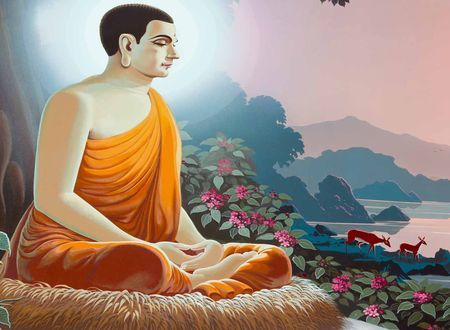Irrespective of what path you are on, your determination to persist and persevere, your resolve to tread the path, your eagerness to adapt, adopt and learn, and your enthusiasm and intensity, determine the outcome.
The Sanskrit term for a vow, for determination, for an oath is sankalpa.
When you take a decision, a stand, you have taken a saṅkalpa/sankalpa. The previous post in the series had a story of a devotee’s sankalpa. The practice of tyaga, letting go, strengthens your will power to better carry out your vows.
The impact of practicing sankalpa
Carrying out these practices greatly strengthen your consciousness. While a pure mind, pure consciousness, the pristine soul is your natural state, it does take an intense effort to tame your mind so you can lead it to the transcendental state and learn to maintain such a state.
A critical point to note is that you need not give up or have vows that extend your whole lifetime. All practices in Mental Transformation are to be done for a specified period starting from a few days to a few weeks or months. Thereafter, you can decide if you want to repeat or carry on with them forever. If you are detached, your habits cannot bind you. Your level of detachment, however, can only be ascertained once you are removed from the object of your attachment.
Getting back to the present topic of sankalpa, the practice of resolve requires determination and intensity. The yoga sutras state:
तीव्रसंवेगानामासन्नः॥
tīvrasanvēgānāmāsannaḥ॥ (Patanjali Yoga Sutras, 1.21)
The one who is firmly established in his practices with vigor and intensity reaches his goal before long.
Also:
मृदुमध्याधिमात्रा ततोऽपि विशेषः॥
mridumadhyādhimātrā tatō api viśēṣaḥ॥ (ibid, 1.22)
Results vary according to the intensity. There are mild, average, and keen practitioners.
Think of passing an entrance examination; say, for securing a place in that prestigious institution, in that sought-after course, you ought to prepare keenly. You may take things a little lightly once you are in. Initially, you have to work hard. The quality, discipline, and intensity of your preparation directly affects the outcome. It is the difference between failure and success.
There are always going to be blockages. Whether you see them as hurdles you can jump across or obstacles you cannot eliminate depends on your own mindset. Following and sticking to your sankalpa infuses your mind with great power and determination.
In one simple aphorism, Patanjali aptly nails down all the possible hurdles one may encounter in carrying out any practice:
व्याधिस्त्यानसंशय प्रमादालस्याविरति भ्रान्तिदर्शनालब्ध भूमिकत्वानवस्थितत्वानि चित्तविक्षेपास्तेऽन्तरायाः ।
vyādhistyānasanśaya pramādālasyāvirati bhrāntidarśanālabdha bhūmikatvānavasthitatvāni cittavikṣēpāstē̕ntarāyāḥ । (ibid, 1.30 )
Disease, sluggishness, doubt, inattentiveness, torpor, unrestrained senses, erroneous views, procrastination, and relapse are the obstacles in one’s practice.
Krishna says to Arjuna:
स निश्चयेन योक्तव्यो योगोऽनिर्विञणचेतसा॥
संकल्पप्रभवान्कामांस्त्यक्त्वा सर्वानशेषतः।
मनसैवेन्द्रियग्रामं विनियम्य समन्ततः॥
sa niścayēna yōktavyō yōgō anirviñaṇacētasā॥
saṅkalpaprabhavānkāmānstyaktvā sarvānaśēṣataḥ।
manasaivēndriyagrāmaṁ viniyamya samantataḥ॥ (Bhagavad Gita, 6.23, 24) One should engage oneself in the practice of yoga with unflinching determination and faith. Abandoning sense gratification and letting go of all attachments, one should restrain one’s senses and mind.
Let me elaborate with an example: Let us assume you vow to sit still for sixty minutes every day for the next forty days. You decide to sit still like a rock in the same posture for those sixty minutes no matter what. For that one hour, with great will power and determination, you are going to build your concentration with great mindfulness. You are going to make every attempt to remember that during the hour of your practice, each time your mind wanders off, you will gently bring it back to your object of focus.
A certain degree of determination is required to do the aforesaid. As you progress with resolve, you will find your conditioned mind becoming feeble. You will experience an inexplicable inner strength. Such new-found strength will enable you to reach sahaja, an emergent natural state of bliss, ultimately.
During your period of sankalpa, if you miss your practice even once, that is a hundred percent breach of practice and requires restarting. As part of the practice, you can resolve to do anything else. Sitting still is merely one example.
I have devoted twenty years of my life to doing various practices around mantra yoga, the way of the sacred sounds. In the science of mantras, an area of my specialization, puraścaraṇa, the esoteric practice of bringing a mantra to life, is primarily based around the practice of resolve.
With detachment, strengthened will, and consciousness, with your ability to live in solitude and practice silence, you are well on your way to start working towards building one-pointed concentration. Such concentration, coming up next in the series, will enable you to ‘learn’ to meditate.
A journey of a thousand miles starts with a single step; unless of course, you are taking a chartered flight. Remember though, in the dense forest of desires, in the deep ocean of the proclivities of the conditioned soul, in the endless and baseless sky of expectations, no plane can land.
Peace.
Swami
A GOOD STORY
There were four members in a household. Everybody, Somebody, Anybody and Nobody. A bill was overdue. Everybody thought Somebody would do it. Anybody could have done it but Nobody did it.
Don't leave empty-handed, consider contributing.It's a good thing to do today.









Comments & Discussion
18 COMMENTS
Please login to read members' comments and participate in the discussion.